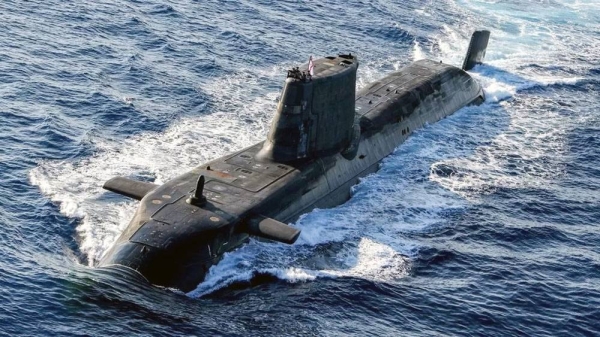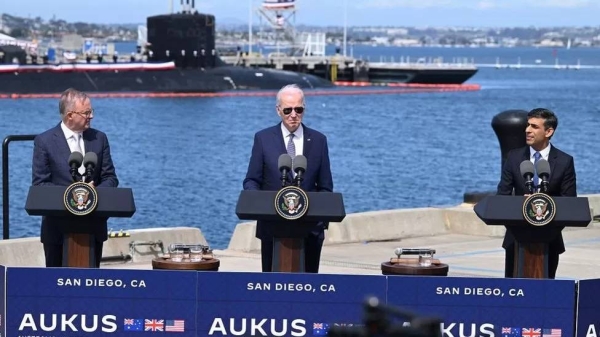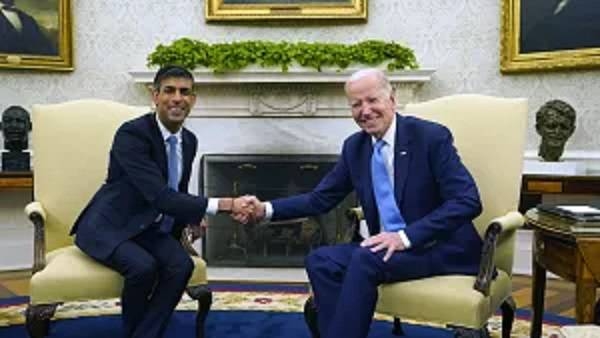
Britain and the US are battling to contain an international backlash over a nuclear submarine pact struck with Australia amid concerns that the alliance could provoke China and prompt conflict in the Pacific.
Boris Johnson told MPs that the Aukus defence agreement was “not intended to be adversarial” to China. But Beijing accused the three countries of adopting a “cold war mentality” and warned they would harm their own interests unless it was dropped.
Johnson’s predecessor as prime minister, Theresa May, questioned whether the pact meant Britain could be dragged into a war with an increasingly assertive China over Taiwan as Washington demands a greater British presence in the Pacific.
In Washington, the US defence secretary, Lloyd Austin, made clear that the administration had chosen to close ranks with Australia in the face of belligerent Chinese behaviour.
Austin said he had discussed with Australian ministers “China’s destabilising activities and Beijing’s efforts to coerce and intimidate other countries, contrary to established rules and norms”, adding: “While we seek a constructive results-oriented relationship with [China], we will remain clear-eyed in our view of Beijing’s efforts to undermine the established international order.”
The fallout followed Wednesday night’s announcement of the Aukus agreement, under which the US and UK will share sensitive technology with Australia to let it develop its first nuclear-powered submarines. The pact was described by the UK’s national security adviser, Stephen Lovegrove, as “perhaps the most significant capability collaboration in the world anywhere in the past six decades”.
May asked Johnson in the Commons: “What are the implications of this pact for the stance that would be taken by the UK in its response should China attempt to invade Taiwan?”
In reply, the prime minister was careful not to rule anything out. “The UK remains determined to defend international law and that is the strong advice we would give to our friends across the world, and the strong advice that we would give to the government in Beijing,” he said.
Beijing has been adopting an increasingly aggressive stance towards Taipei, which has long received military support from the US. Military shows of strength are frequent: this month China sent 19 aircraft, including nuclear-capable bombers, into Taiwan’s “air defence identification zone” on the eve of Taipei’s annual war games exercises.
China’s foreign ministry spokesperson, Zhao Lijian, said the country questioned Australia’s “commitment to nuclear non-proliferation” in the light of the agreement and accused the three partners of engaging in an “obsolete cold war zero-sum mentality”. The spokesperson added: “China will closely monitor the situation.”
Australia’s defence minister, Peter Dutton, shrugged off Beijing’s reaction.
“This is not the first time that we’ve seen different outbursts from China in terms of Australia’s position,” Dutton told journalists in Washington. “We are a proud democracy in our region. We stand with our neighbours in the Indo-Pacific to ensure enduring peace, and this collaboration makes it a safer region. That’s the reality and no amount of propaganda can dismiss the facts.”
Later, Johnson told the Commons that China had in effect misunderstood: “I think it is important for the house to understand that Aukus is not intended to be adversarial towards any other power.”
As a result of the pact, Australia will become only the seventh nation in the world to possess nuclear-powered submarines, matching a capability already held by China. The submarines can remain submerged for up to five months and are harder to detect than conventional diesel equivalents.
Since taking office, the US president, Joe Biden, has been keen to seek international alliances to bolster a more assertive stance towards China, which now possesses the world’s largest navy. Over the summer, Nato declared that China posed a strategic threat for the first time.
Shi Yinhong, a professor of international relations at Renmin University of China, said the agreement was “undoubtedly” about countering China. He added: “China will definitely counter it, but the question is what kind of counter it would be.”
British ministers were also forced to placate France, a Nato ally, after it emerged that Australia had cancelled a planned a A$90m (£48m) upgrade for French-designed diesel-powered submarines in order to switch to nuclear in the future.
“It’s really a stab in the back,” said France’s foreign minister, Jean-Yves Le Drian. The minister said that Paris had been taken by surprise as the agreement had not been mentioned in recent discussions with the US about Indo-Pacific policy. “We had been discussing that with the US just recently, and here comes this break,” Le Drian said, calling it “a huge breach of trust”. Senior EU officials also complained that they had not been consulted.
In a joint appearance with Australian ministers on Thursday, the US secretary of state, Tony Blinken, sought to limit the damage to relations with Paris, telling reporters that he and other top US officials had been in touch with their French counterparts in the run-up to the announcement of the Aukus partnership and immediately after.
“France in particular is a vital partner on this, and so many other issues stretching back generations, and we want to find every opportunity to deepen our transatlantic cooperation in the Indo-Pacific, and around the world.”
The first that Paris knew about Aukus were press leaks on Wednesday, hours before the announcement. When it was apparent at the beginning of the week that high level US-Australian meetings were planned in Washington, French officials asked for meetings with their US counterparts but were told they were unavailable. The first face-to-face meeting on the issue was between the French ambassador to Washington, Philippe Étienne, and Jake Sullivan, the US national security adviser, on Wednesday, after the news had broken.
Standing alongside Blinken, Dutton sought to explain Australia’s decision to scrap the French submarine contract and opt for cooperation with the US and UK instead. He said diesel-powered boats would not give Australia “regional superiority” stretching into the 2040s.
He said the French nuclear-powered option “was not superior to” the US-UK option, but was vague on why the final choice was made.
French officials say the Australian government never raised the possibility of ordering nuclear-powered vessels with Naval Group, the French shipbuilders who had been contracted in 2016 to build Australia’s submarines.
Ben Wallace, the UK defence secretary, said on Thursday that he understood France’s disappointment about the loss of a lucrative export deal, but argued it was driven “by an Australian change in its capability requirement” – at least initially.
“If we all step back from it, France and Britain and the US agree on so many things together. We agree on the same rules-based order, we agree on freedom of navigation, we agree on respecting human rights,” he added.
Wallace said it was Australia that came to the UK seeking a deal in March, after a secret yearlong study programme in which it concluded it wanted to abandon the French upgrade.
Both countries then went to the US. Johnson joined the Australian prime minister, Scott Morrison, and Biden for a trilateral meeting on the sidelines of the G7 summit in Cornwall in June.
There, the three discussed the pact in principle, although what began as a technology deal widened into a broader three-way alliance with plans to share other military technologies including artificial intelligence.
The submarines will be built in Adelaide, but Australian sources said they expected the nuclear-powered engines, which rely on highly enriched weapons-grade uranium, to be produced in the US or in the UK, where they are made by Rolls-Royce.
The exact manufacturing process has yet to be decided, however, pending an 18-month initial review. It is also unclear where the Australian reactors will ultimately be decommissioned. In the UK, nuclear-powered subs are taken out of service at the Devonport dockyard near Plymouth and the reactor cores taken to Sellafield in Cumbria.












